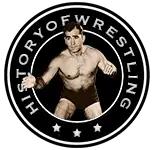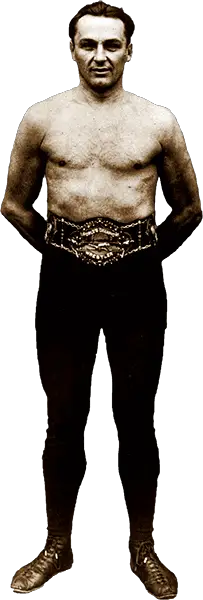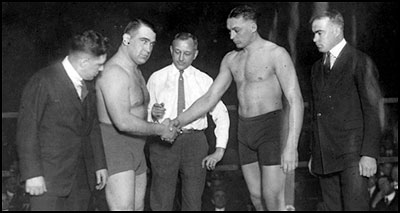by Stephen Von Slagle
In the years immediately following the retirement of wrestling’s top star of the early twentieth century, Frank Gotch, pro wrestling experienced a bit of a tailspin. Without the credibility brought to the profession by the popular and respected Gotch, nor the impressive revenue generated while the internationally known champion held the World title, promoters were desperate to find “the next Frank Gotch.” Of course, a star such as Gotch comes only once or twice per generation, but with his absence from the sport came opportunity for those matmen who were ambitious and talented enough to answer the call. With the undisputed champion in retirement, a “new number one” was ready to be crowned and a bounty of talented grapplers stepped up to the challenge. One of those early post-Gotch champions was an athletic, talented wrestler by the name of Joe Stecher. Wrestling in the shadow of the legendary Gotch was no easy task, but Stecher was more than determined to establish himself as the best wrestler in the world and, as the World Heavyweight champion for more than six years all total, he undoubtedly proved his worth while forever cementing his lofty position in professional wrestling history.
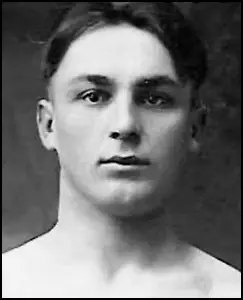 Following the retirement of the sport’s number one attraction in 1913, promoters across the country were searching for someone that could fill the void left by Gotch’s departure from wrestling. Nebraska’s Joe Stecher was one of the top young grapplers of the day and after amassing an impressive collection of victories throughout the Midwest and Western states, Stecher came to national prominence on July 5, 1915. That date marks the day that the unassuming 22 year-old Stecher defeated Charlie Cutler for the World championship in what was, at that time, one of the premier wrestling cities in the world, Omaha, Nebraska. In fact, Gotch himself was in attendance that night in Omaha and it was with the world-renowned former champion’s public support that the new titleholder set out to carry on in the tradition of other greats who had held the belt. At the same time, it was crucial for a wrestler to stake his own claim as a deserving champion and the best way to do that was to defeat the previously reigning titleholder. Because Gotch had retired undefeated as champion, no one was able to “get the rub” and, so, promoters set about finding a way to rectify the situation. Gotch was approached and, after numbers were discussed, he agreed to face Stecher on July 18, 1916. The biggest “dream match” in years was set and, once the pre-bout promotion kicked in, fans of the day were clamoring for the chance to see Gotch once again, this time competing against one of the most impressive young stars in the sport. Unfortunately, it never happened, due to Gotch breaking his leg a few months prior to the much-anticipated match.
Following the retirement of the sport’s number one attraction in 1913, promoters across the country were searching for someone that could fill the void left by Gotch’s departure from wrestling. Nebraska’s Joe Stecher was one of the top young grapplers of the day and after amassing an impressive collection of victories throughout the Midwest and Western states, Stecher came to national prominence on July 5, 1915. That date marks the day that the unassuming 22 year-old Stecher defeated Charlie Cutler for the World championship in what was, at that time, one of the premier wrestling cities in the world, Omaha, Nebraska. In fact, Gotch himself was in attendance that night in Omaha and it was with the world-renowned former champion’s public support that the new titleholder set out to carry on in the tradition of other greats who had held the belt. At the same time, it was crucial for a wrestler to stake his own claim as a deserving champion and the best way to do that was to defeat the previously reigning titleholder. Because Gotch had retired undefeated as champion, no one was able to “get the rub” and, so, promoters set about finding a way to rectify the situation. Gotch was approached and, after numbers were discussed, he agreed to face Stecher on July 18, 1916. The biggest “dream match” in years was set and, once the pre-bout promotion kicked in, fans of the day were clamoring for the chance to see Gotch once again, this time competing against one of the most impressive young stars in the sport. Unfortunately, it never happened, due to Gotch breaking his leg a few months prior to the much-anticipated match.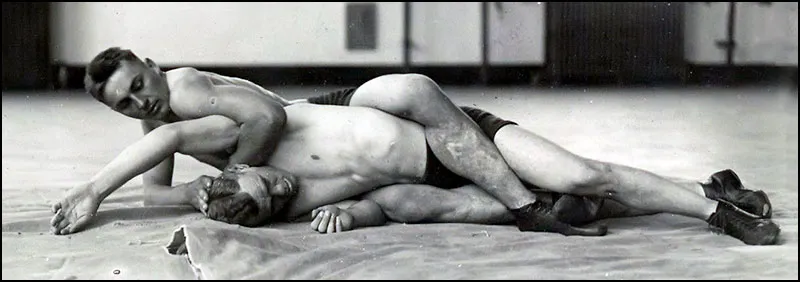 Joe Stecher was the wrestler who popularized the Leg Scissors in professional wrestling, and it was with his trademark submission move (which could be placed either on the head or the torso) that Stecher won a large percentage of his matches, both before and after he became the World Heavyweight champion. While he was by no means a large man, the 6’2′, 215 lbs. Stecher was wiry and athletic, deceivingly strong, and well-versed in the fundamentals of grappling. The young shooter sat atop the wrestling world as the Heavyweight champion, defending his title frequently and serving as the post-Gotch ambassador of his sport. While it’s true that it was nearly impossible to match Gotch’s extraordinary popularity or his immense box-office drawing power, the soft-spoken but highly competent Stecher was still a definite crowd favorite and a successful champion in virtually every measurable way.
Joe Stecher was the wrestler who popularized the Leg Scissors in professional wrestling, and it was with his trademark submission move (which could be placed either on the head or the torso) that Stecher won a large percentage of his matches, both before and after he became the World Heavyweight champion. While he was by no means a large man, the 6’2′, 215 lbs. Stecher was wiry and athletic, deceivingly strong, and well-versed in the fundamentals of grappling. The young shooter sat atop the wrestling world as the Heavyweight champion, defending his title frequently and serving as the post-Gotch ambassador of his sport. While it’s true that it was nearly impossible to match Gotch’s extraordinary popularity or his immense box-office drawing power, the soft-spoken but highly competent Stecher was still a definite crowd favorite and a successful champion in virtually every measurable way.
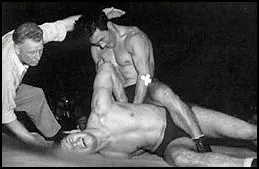 When Stecher’s first reign as the World champion ended on April 9, 1917, it was considered a major upset. The talented young champion, who had still not yet reached the age of 25, was nearing his second year as champion when he was defeated by the relatively unknown, at the time, Earl Caddock in a hard-fought bout. Following his loss of the championship, Stecher remained one of the top wrestlers in the game and a solid performer at the box-office. Eventually, he worked his way back into the championship picture and on January 30, 1920, Stecher defeated Caddock for the World title in a rematch held in New York City.
When Stecher’s first reign as the World champion ended on April 9, 1917, it was considered a major upset. The talented young champion, who had still not yet reached the age of 25, was nearing his second year as champion when he was defeated by the relatively unknown, at the time, Earl Caddock in a hard-fought bout. Following his loss of the championship, Stecher remained one of the top wrestlers in the game and a solid performer at the box-office. Eventually, he worked his way back into the championship picture and on January 30, 1920, Stecher defeated Caddock for the World title in a rematch held in New York City.
After an eleven-month run with the belt, during which time he faced the best wrestlers of the day, Stecher came up against the man who was perhaps the most formidable opponent of his career, a wrestler who would emerge as the most dominant wrestler of the post-Gotch era, the feared Ed “Strangler” Lewis. The two shooters had faced each other several times before, competing in legitimate contests, most notably wrestling to a legendary five-hour draw in 1916. But, on December 13, 1920, Lewis, the most skilled & dangerous wrestler in the game at that time, defeated Stecher for the World title, ending his second reign as the champion. Years later, Joe Stecher commented that “Ed Lewis was the toughest man I ever wrestled.”
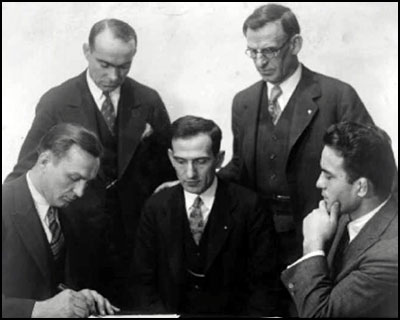
Promoter Tom Packs oversees the contract signing of Joe Stecher, left (accompanied by his brother Tony) and Jim Londos, right (accompanied by his promoter Joe Coffey)
Following his loss of the title, the talented Nebraskan continued on as one of wrestling’s most recognized names and a consistent top draw in arenas around the country. After competing for several years without winning a championship, by the mid-Twenties the resilient Stecher (who was still relatively young, despite his many years of experience) was once again in the hunt for the title. On May 30, 1925, he defeated another legendary name from the past, the great Stanislaus Zbyzsco, for the World Heavyweight Wrestling championship in St. Louis, Missouri. Over the course of the following three years, the three-time World champion utilized his skill and speed to maintain a firm hold on the World title. However, eventually, he again crossed paths with the nearly unbeatable Ed “Strangler” Lewis and, as had been the case several years earlier, Stecher lost his World title to Lewis on February 20, 1928.
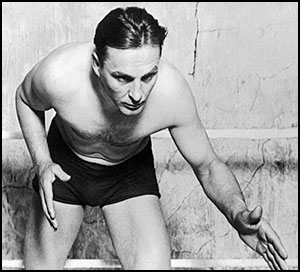 After several more years of competition, Joe Stecher finally retired in 1934, capping off a career that lasted over twenty years. But, soon after leaving the business, his life hit an unexpected, tragic road bump. The legendary Lou Thesz explained the calamitous situation in his book Hooker: An Authentic Wrestler’s Adventures In The Bizarre World Of Professional Wrestling, saying, “Unfortunately, Joe Stecher had come to a sad end. He had done extremely well in wrestling — for instance, he earned a $29,000 payoff from a single match in 1928, which was a fortune — and was comfortably fixed for his retirement. But, some whiz artists got hold of him in the early 1930s and conned him out of almost every cent. It was an emotional shock from which he never recovered, and his brother finally had him hospitalized for ‘melancholy’ in St. Cloud, Minnesota. Joe Stecher was a very nice man, but you could see while talking to him that something wasn’t quite right. Today, the doctors could probably treat whatever it was that afflicted him, but there was nothing to be done for him in those days. Tony ended up having to put him back in the sanitarium. Several years later, in the early 1940s, Joe was transferred to a Veteran’s Hospital, and that’s where he remained until his death in 1974.”
After several more years of competition, Joe Stecher finally retired in 1934, capping off a career that lasted over twenty years. But, soon after leaving the business, his life hit an unexpected, tragic road bump. The legendary Lou Thesz explained the calamitous situation in his book Hooker: An Authentic Wrestler’s Adventures In The Bizarre World Of Professional Wrestling, saying, “Unfortunately, Joe Stecher had come to a sad end. He had done extremely well in wrestling — for instance, he earned a $29,000 payoff from a single match in 1928, which was a fortune — and was comfortably fixed for his retirement. But, some whiz artists got hold of him in the early 1930s and conned him out of almost every cent. It was an emotional shock from which he never recovered, and his brother finally had him hospitalized for ‘melancholy’ in St. Cloud, Minnesota. Joe Stecher was a very nice man, but you could see while talking to him that something wasn’t quite right. Today, the doctors could probably treat whatever it was that afflicted him, but there was nothing to be done for him in those days. Tony ended up having to put him back in the sanitarium. Several years later, in the early 1940s, Joe was transferred to a Veteran’s Hospital, and that’s where he remained until his death in 1974.”
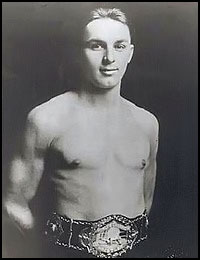 Joe Stecher is a member of the Wrestling Observer Newsletter Hall of Fame (1996), the International Wrestling Institute & Museum’s George Tragos/Lou Thesz Professional Wrestling Hall of Fame (2000) and the Professional Wrestling Hall of Fame and Museum (2002).
Joe Stecher is a member of the Wrestling Observer Newsletter Hall of Fame (1996), the International Wrestling Institute & Museum’s George Tragos/Lou Thesz Professional Wrestling Hall of Fame (2000) and the Professional Wrestling Hall of Fame and Museum (2002).
Joseph Stecher passed away on March 29, 1974 at the age of 80.
